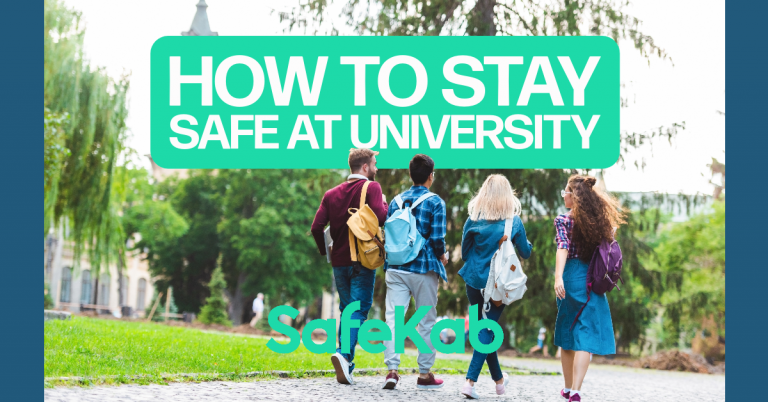Going off to university is an exciting and transformative time in many young people’s lives. It’s an opportunity to gain knowledge, make new friends, and embark on a journey of self-discovery. While university life offers countless possibilities, it’s vital to prioritise safety and take precautions to protect yourself and others. In this article, SafeKab will explore the top ways to stay safe at university, covering everything from personal safety on campus, building a support network, responsible alcohol, and drug use, utilising campus resources, online safety, reporting incidents, safe living spaces, party safety, and mental health and wellness.
Personal Safety on Campus
It’s important to be mindful of your personal safety on campus. Consider the following tips:
Familiarise Yourself with Campus Layout and Emergency Exits: Take the time to explore the campus, locate emergency exits, and become familiar with important buildings and landmarks. This knowledge will help you navigate safely in any situation.
Walk in Well-Lit Areas and Use Campus Escort Services: Stick to well-lit pathways, especially when walking alone at night. Many universities offer campus escort services, providing additional security when traveling on campus after dark.
Keep Personal Belongings Secure and Be Cautious of Strangers: Always lock your room if your staying in student halls and secure your personal belongings. Additionally, be cautious when interacting with strangers and avoid sharing personal information until you know them better.
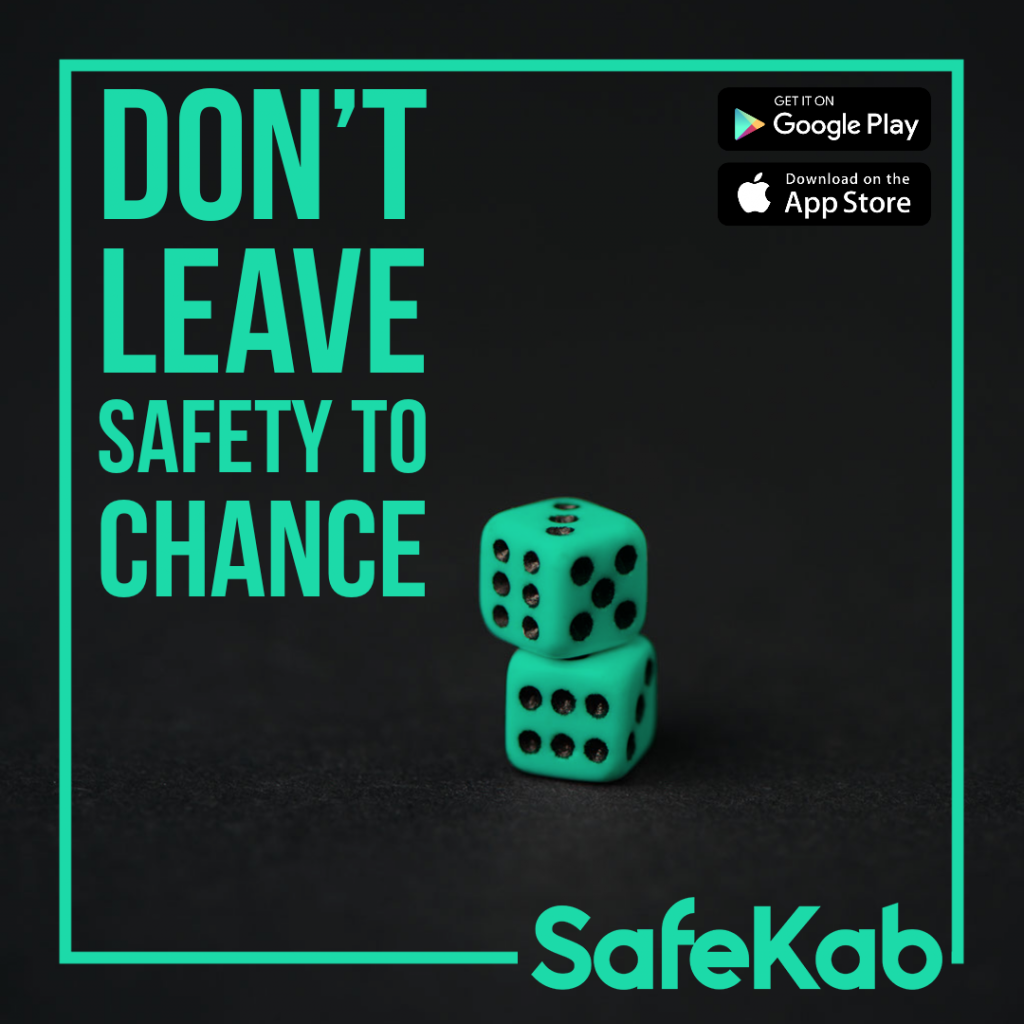
Building a Support Network
Building a support network within the university community is vital for both personal and safety reasons. Here’s how you can create a strong support system:
Seek Out Student Organisations and Clubs: Joining student organisations and clubs is an excellent way to make friends with similar interests and connect with a supportive community.
Connect with Roommates and Neighbours: Foster positive relationships with your roommates and neighbours. They can provide an additional layer of security and support.
Establish Relationships with University Staff and Advisors: Get to know the university staff, such as professors, advisors, and residence hall staff. They can offer guidance, support, and valuable resources when needed.
Responsible Alcohol and Drug Use
Socialising and partying are common aspects of the university experience, but it’s important to approach alcohol and drug use responsibly. Here are some tips for staying safe:
Drink Responsibly and Know Your Limits: Pace yourself when consuming alcohol, know your limits, and avoid excessive drinking. Binge drinking can lead to dangerous situations and put your well-being at risk.
Avoid Accepting Drinks from Strangers: Be cautious when accepting drinks from individuals you don’t know or trust. Drinks can be spiked with substances that impair your judgment and put you in vulnerable situations.
Be Aware of the Dangers of Substance Abuse: Educate yourself about the risks and consequences of substance abuse. Understand the potential physical and mental health effects, as well as legal ramifications.
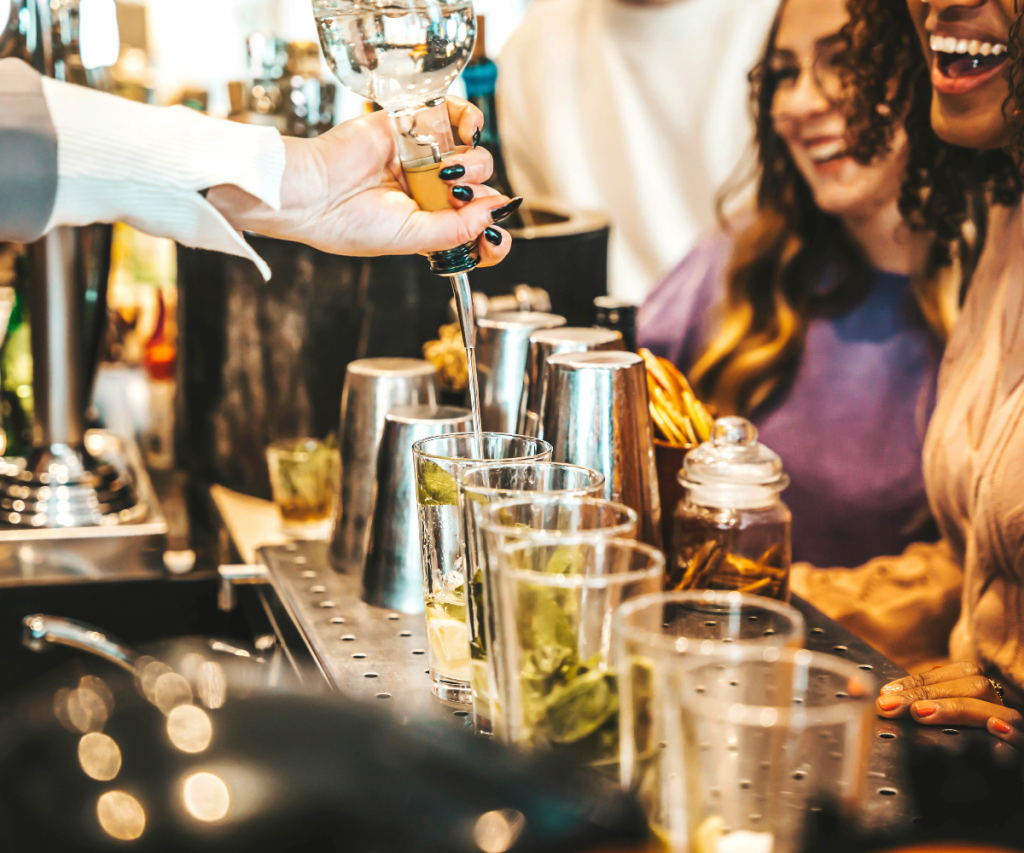
Utilising Campus Resources
University campuses offer a range of resources to promote safety and well-being. Make the most of these resources:
Familiarise Yourself with Campus Security Services: Take the time to learn about the campus security services available to you, such as the campus security members, emergency phone lines, and safety apps. Knowing who to contact in case of an emergency is crucial.
Attend Safety Workshops and Self-defence Classes: Many universities provide safety workshops and self-defence classes. These initiatives empower you with knowledge and skills to protect yourself in different situations.
Utilise Counselling Services for Emotional Support: University life can be challenging. If you’re feeling overwhelmed, anxious, or depressed, don’t hesitate to seek support from the university’s counselling services. They can provide guidance and assistance during difficult times.
Online Safety
In today’s digital age, online safety is just as important as physical safety. Protect yourself online with these tips:
Protect Personal Information on social media: Be cautious about the personal information you share on social media platforms. Adjust privacy settings and limit the information visible to the public. Avoid sharing sensitive details that could compromise your safety.
Use Strong and Unique Passwords for Online Accounts: Create strong, unique passwords for your online accounts. Incorporate a combination of upper and lowercase letters, numbers, and special characters. Avoid using easily guessable information.
Familiarise Yourself with Cybersecurity Best Practices: Educate yourself about cybersecurity best practices, such as identifying phishing scams, avoiding suspicious links, and regularly updating your devices and software. Stay vigilant and keep your digital environment secure.
Reporting Incidents
If you witness or experience any safety-related incidents on campus, it’s important to take appropriate action. Follow these guidelines:
Know How to Report Crimes and Suspicious Activity: Familiarise yourself with the reporting procedures for crimes and suspicious activity on campus. Save important emergency numbers on your phone and know where to find help when needed.
Cooperate with Authorities and Provide Accurate Information: If you’re a witness or victim of an incident, cooperate with law enforcement and campus authorities. Provide accurate information to assist in the investigation and ensure the safety of others.
Encourage Others to Report Safety Concerns: Promote a culture of safety by encouraging others to report safety concerns. By speaking up, you contribute to the overall well-being of the university community.
Safe Living Spaces
Whether you live in student halls or an off-campus house or flat, creating a safe living environment is crucial. Consider the following steps:
Secure Your Room or Flat: Lock your doors and windows when you leave, even if it’s just for a short period. Invest in a sturdy door lock and consider additional security measures like a doorstop alarm or security cameras.
Install Necessary Safety Devices, such as Smoke Alarms and Locks: Ensure that your living space has essential safety devices like smoke alarms and fire extinguishers. Regularly test these devices to ensure they are functioning correctly. If you stay in student halls, this should be handled by whoever operates the halls – often the university itself.
Be Mindful of Fire Safety and Electrical Hazards: Follow fire safety protocols, such as avoiding overloaded electrical outlets, not leaving cooking appliances unattended, and knowing the locations of fire escapes and fire extinguishers.
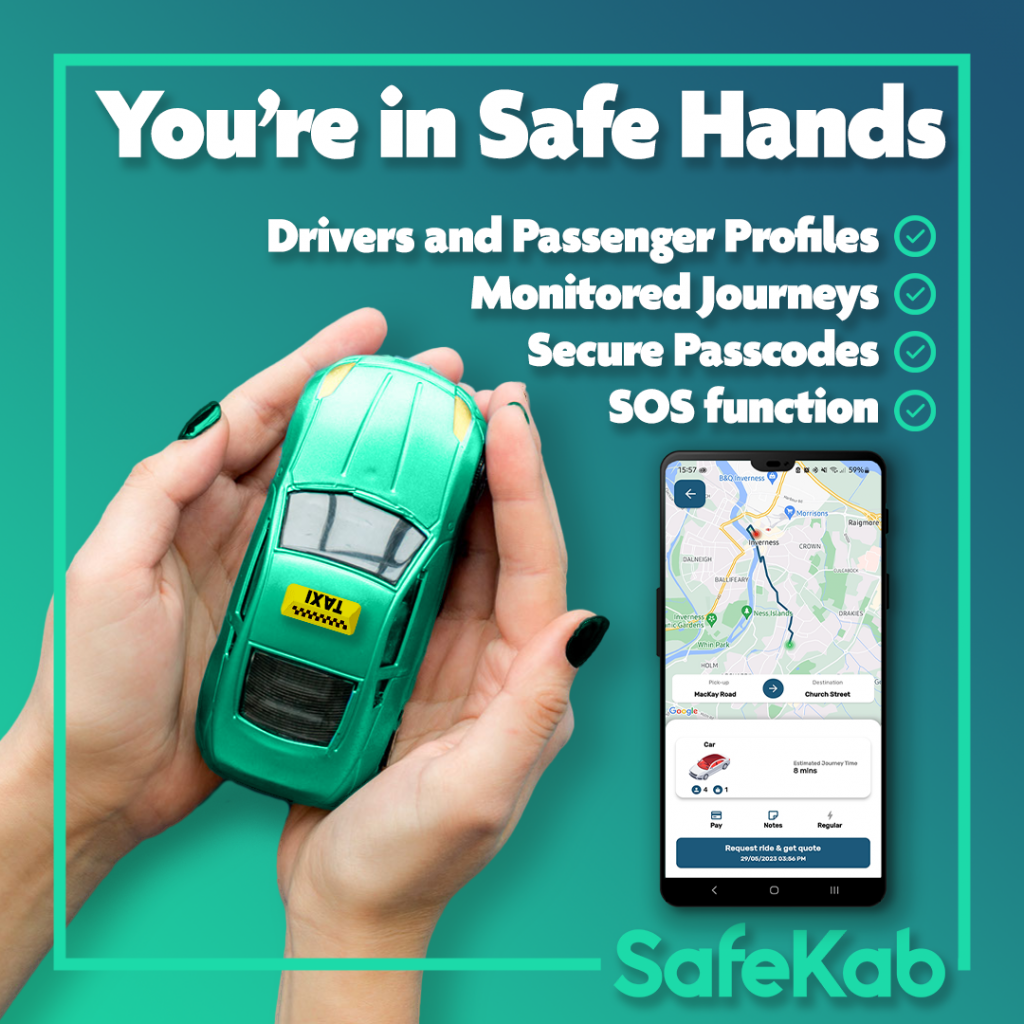
Safety While Partying
Parties are a common occurrence at universities. Here are some tips for staying safe while enjoying social events:
Stay with Trusted Friends and Watch Out for Each Other: Stick together with a group of trusted friends when attending parties or social events. Look out for one another, especially if someone appears overly intoxicated or vulnerable.
Recognise the Signs of Alcohol Poisoning and Drug Overdose: Educate yourself about the signs and symptoms of alcohol poisoning and drug overdose. If you suspect someone is experiencing these emergencies, seek immediate medical help.
Plan Ahead and Have a Designated Driver: If you plan to drink alcohol, designate a sober friend as the driver or arrange for alternative transportation. Don’t drink and drive, and always prioritise your safety and the safety of others.
Book A SafeKab: Take the #safetyfirst option and order a safe secure taxi to take you to and from your night out. When booking with SafeKab you can be sure of a safe ride home after a safe night out.
Our safety features include:
- The Power to Choose your driver, vehicle and price you pay for your ride. Giving you full control and transparency over your journey.
- Unique Safety Code for you and your driver so you know you’re in the right vehicle.
- Journey Monitoring so you can see where you are, the road home and also share this information with a loved one.
- A Panic Button is embedded in our app so if you feel vulnerable at any time, you can press the button and notify both SafeKab’s local cab office and a loved one.
- SafeKab Credit means that you don’t need to carry money or a card to get your ride home. Money can be deposited in your in-app wallet so there is always cash to get you home after a great night out.
Use SafeWalk If You’re Walking Alone: If you’re walking home, please take advantage of SafeKab’s new ‘SafeWalk’ feature.
SafeWalk allows you to share your walk home with a loved one so they can keep an eye on your journey every step of the way. We have also developed a ‘panic button’ that stays on your phone screen, so should you feel threatened you can press the button and notify both the local SafeKab office and a loved one that you need help. With our FREE SafeWalk function, you need never walk home alone ever again!
SafeWalk is completely free to use for anyone who downloads the app! It’s a fantastic tool for students, schools, families, lone women, and anyone who might feel vulnerable while travelling alone. Download the app now and be sure of a safe end to a safe night out.
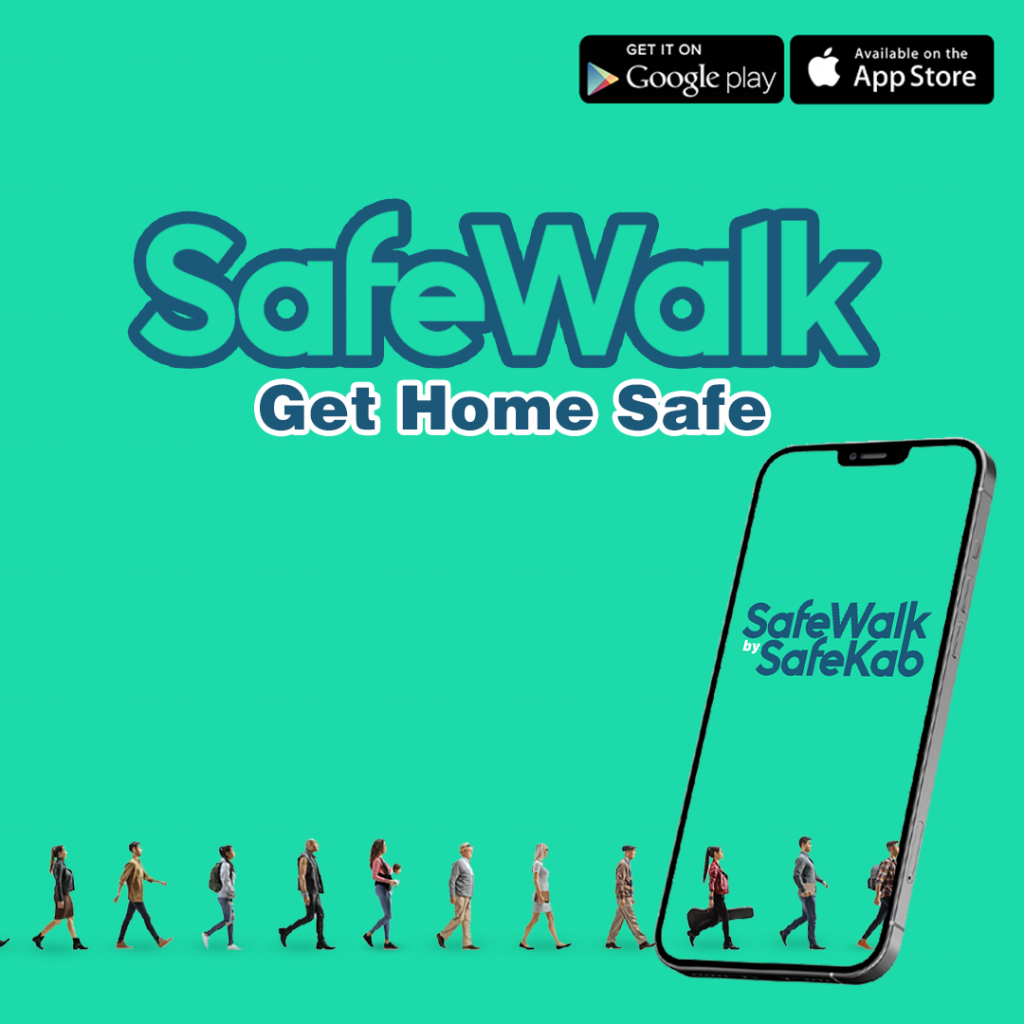
Mental Health and Wellness
Prioritising your mental health and wellness is essential for a fulfilling university experience. Consider the following strategies:
Seek Support from University Counselling Services: If you’re feeling overwhelmed, anxious, or struggling with mental health issues, don’t hesitate to reach out to the university’s counselling services. They can provide guidance and help you navigate challenges.
Practice Self-Care and Manage Stress Levels: Take care of your well-being by practicing self-care. Engage in activities you enjoy, maintain a healthy lifestyle, establish a balance between academics and personal life, and manage stress levels effectively.
Reach Out for Help When Needed: Never hesitate to reach out for help when you need it. There are supportive resources available on campus and within the community. Remember, seeking help is a sign of strength, not weakness.

